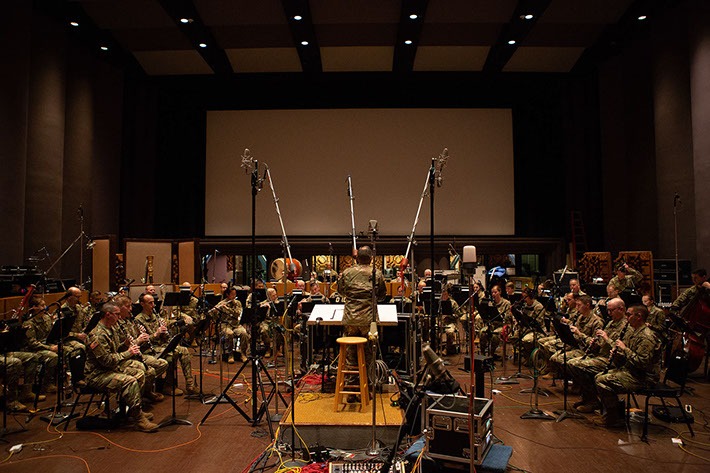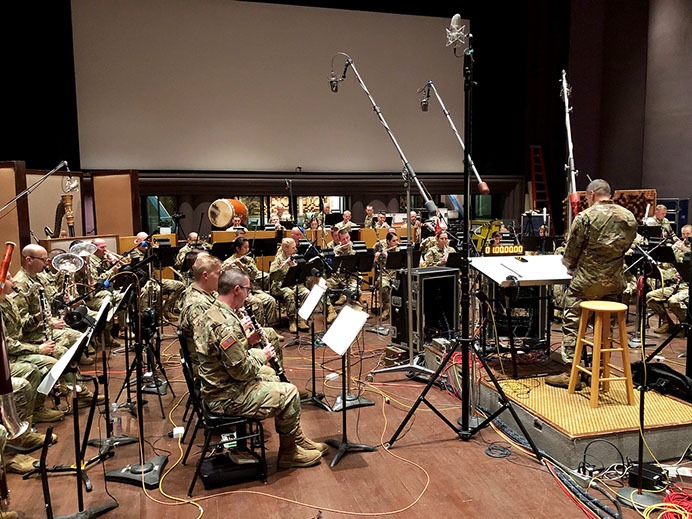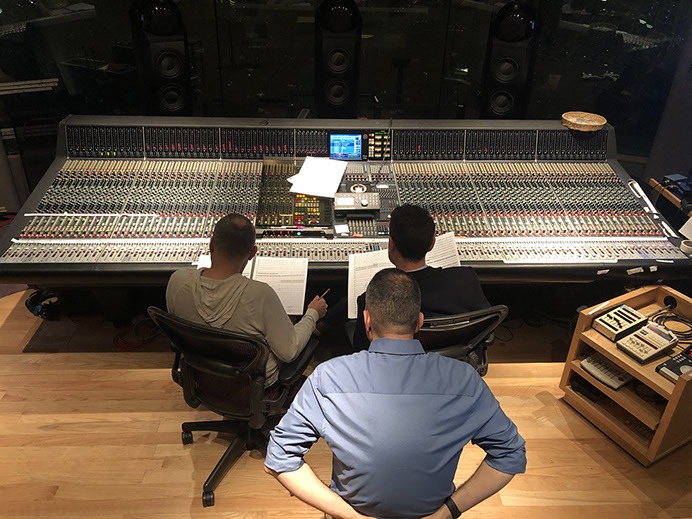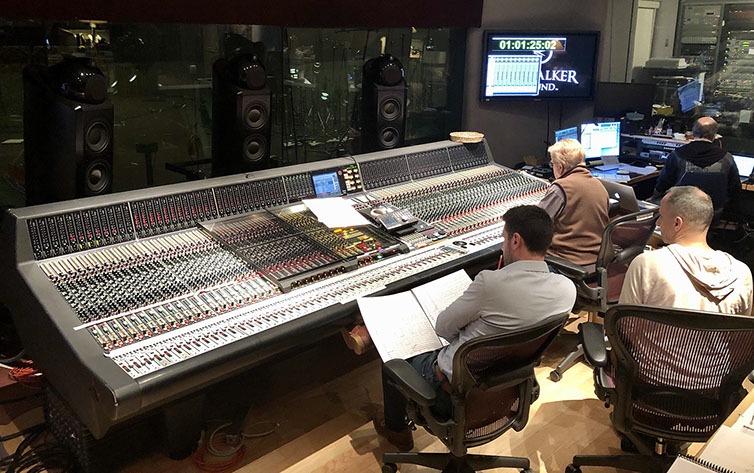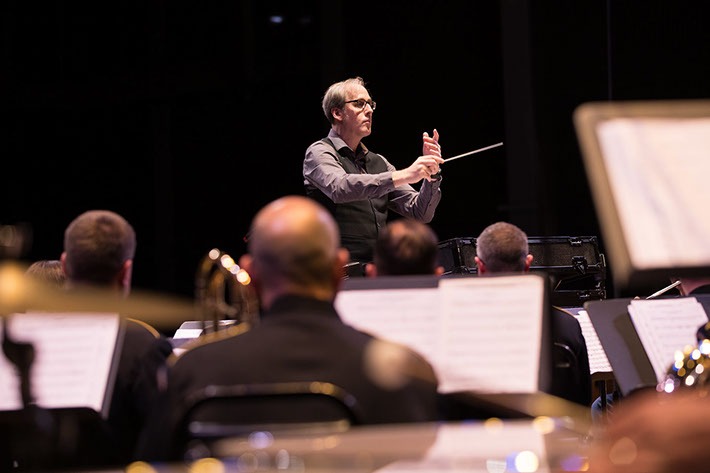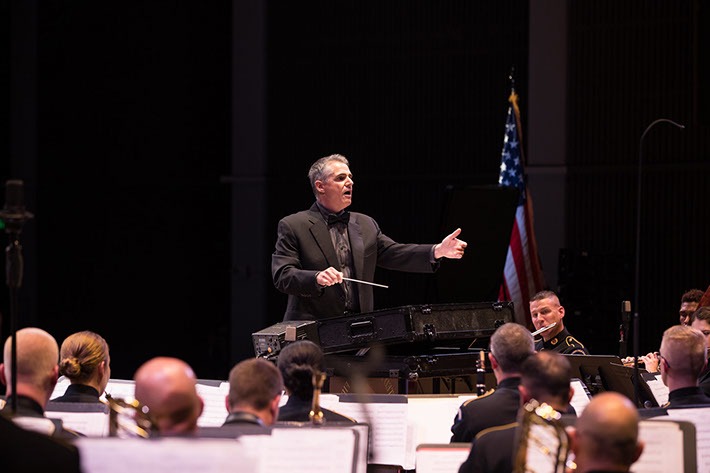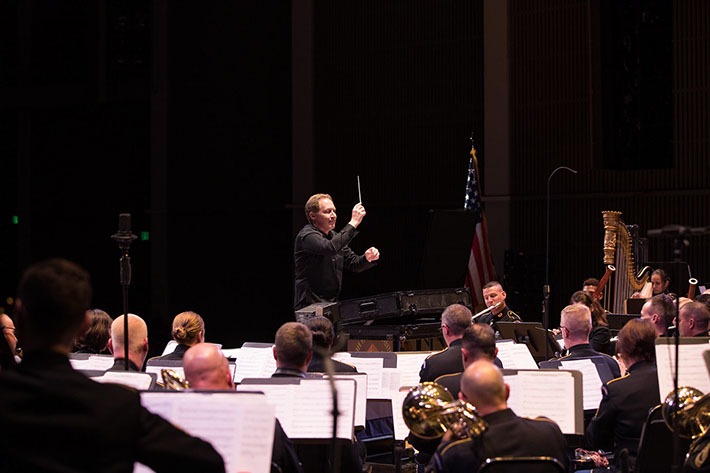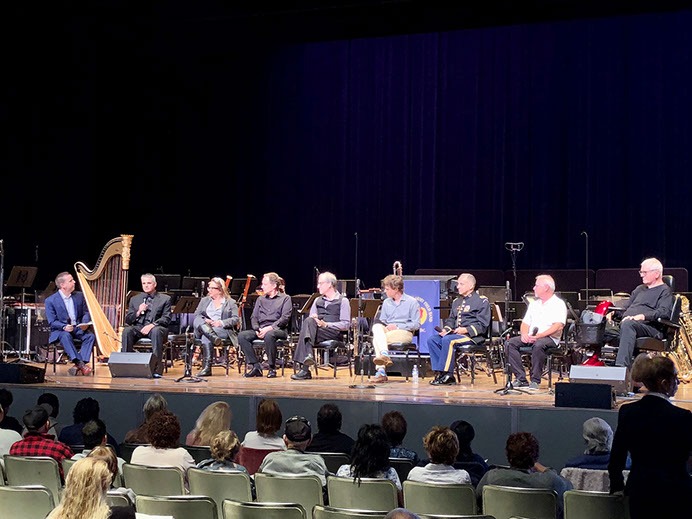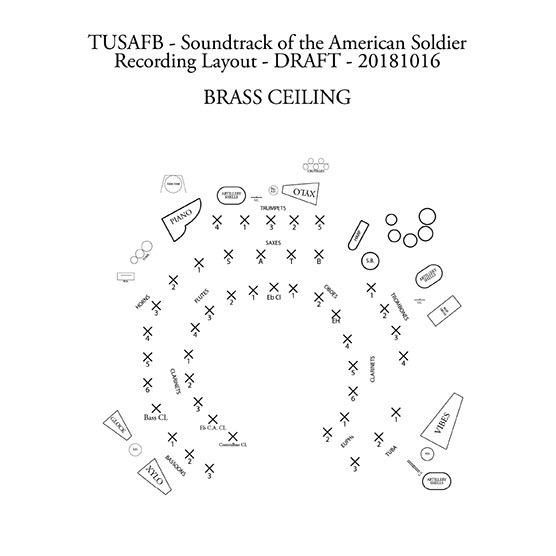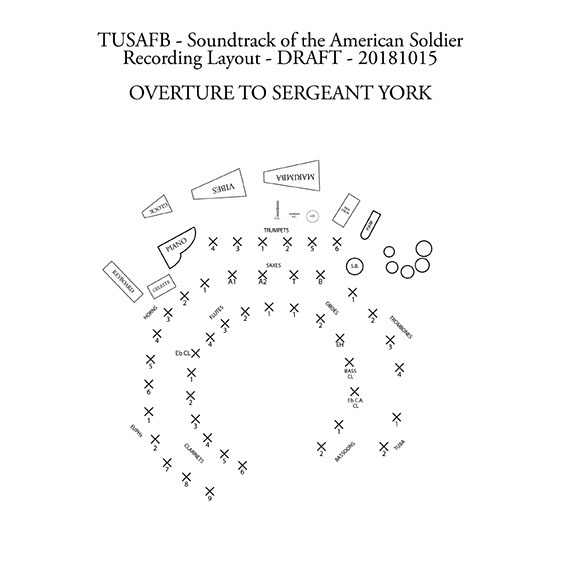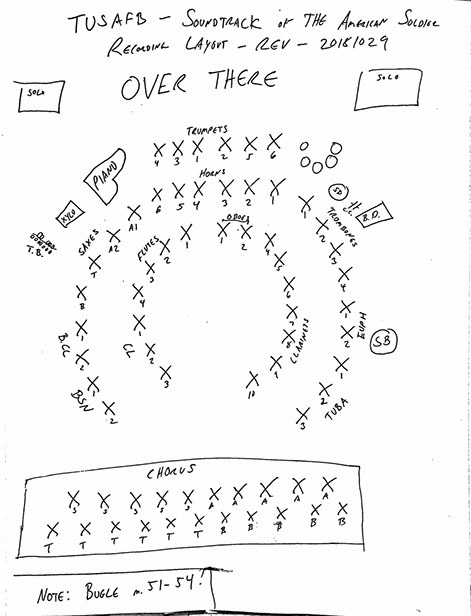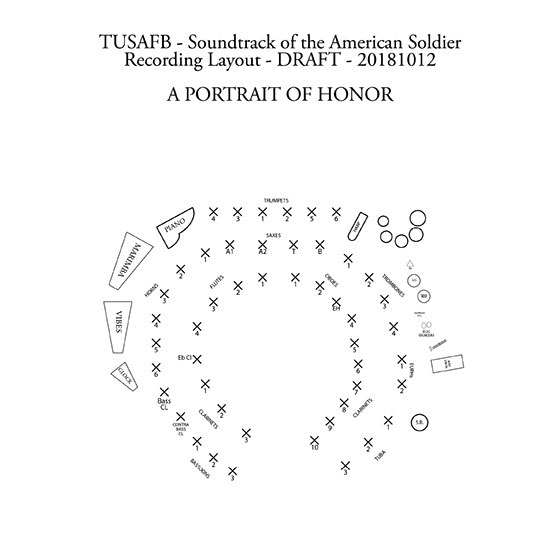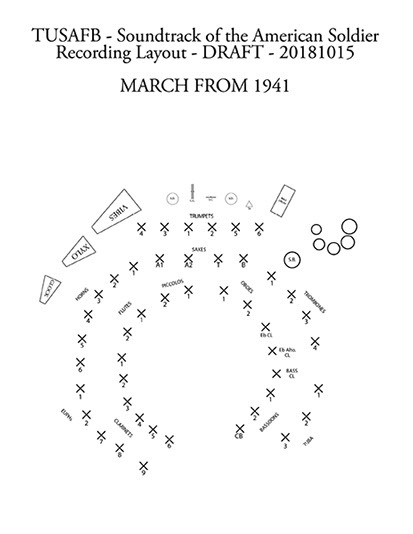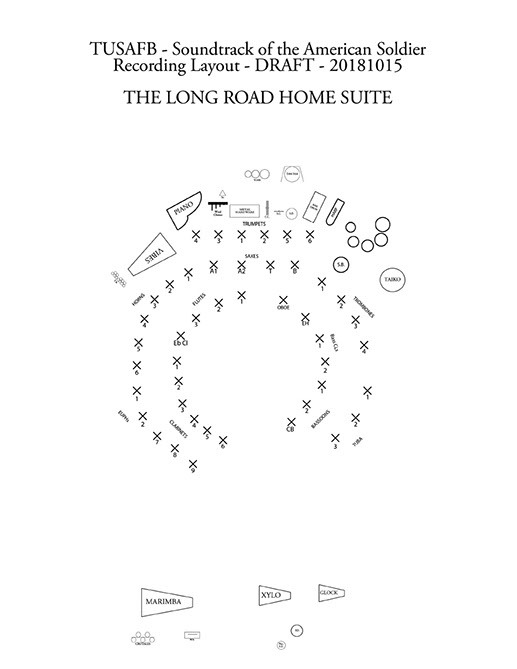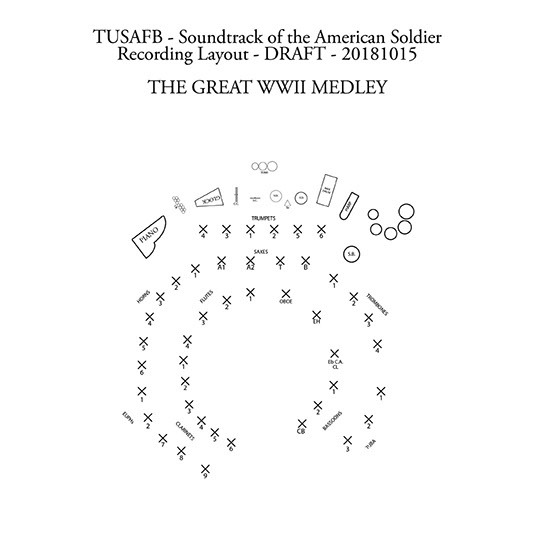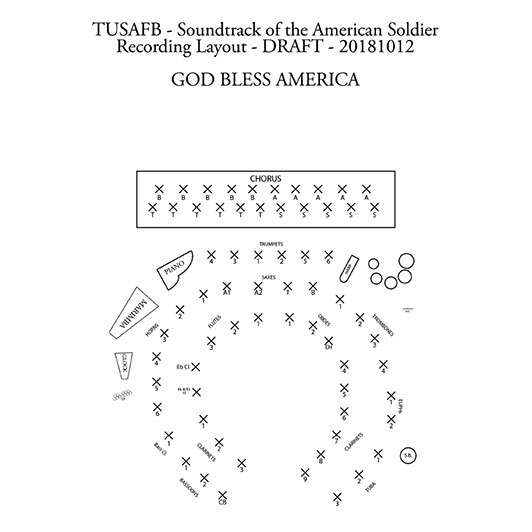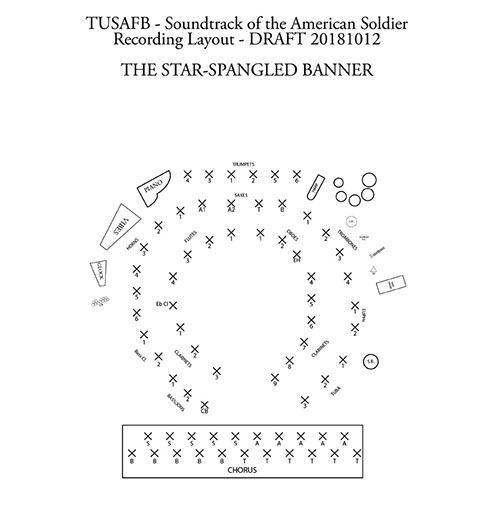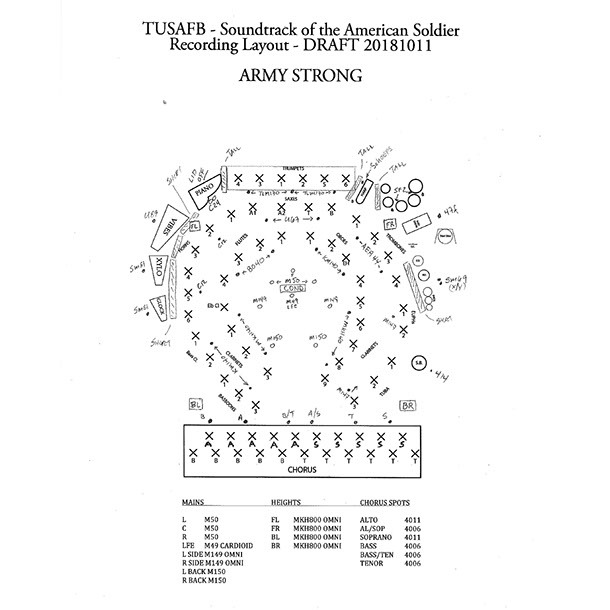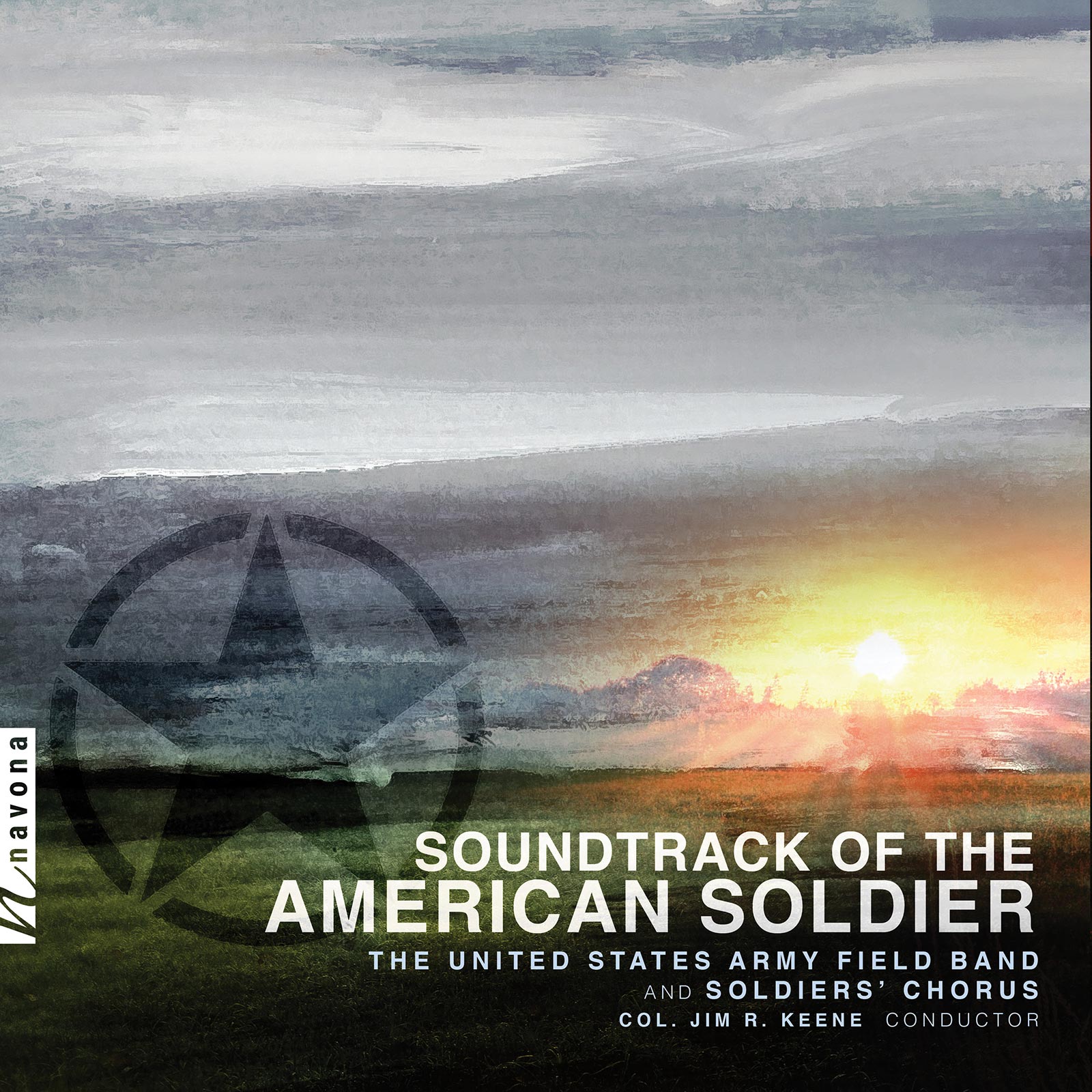
Share Album:
Winner of Best Immersive Audio Album
in 63rd GRAMMY Awards
Soundtrack of the American Soldier
The United States Army Field Band And Soldiers' Chorus | Col. Jim R. Keene conductor
Navona Records presents SOUNDTRACK OF THE AMERICAN SOLDIER, an album of contemporary works for wind band performed by The United States Army Field Band. Led by Colonel Jim R Keene, the Army Field Band is the U.S. Army’s premier touring musical organization. In SOUNDTRACK OF THE AMERICAN SOLDIER, the Army Field Band presents music of classic American films and video games, and in doing so celebrates the stories they portray and the men and women who inspired them. Monitored and mixed in IMMERSIVE DOLBY ATMOS® (5.1.4), SURROUND (5.1), and STEREO, the album immerses the listener in a multi-dimensional soundscape that creates a deeply meaningful connection to the music and the stories it portrays.
Teaming up with some of the most-heralded composers in Hollywood—including Laura Karpman, Joshua Moshier, and Jeff Beal—the Army Field Band performs fresh arrangements of music from the 1941 Gary Cooper classic Sergeant York, the legendary Electronic Arts video game Medal of Honor, and everything in between. SOUNDTRACK OF THE AMERICAN SOLDIER begins with Brass Ceiling: The Journey of General Ann Dunwoody, honoring the life and work of Four Star General Ann Dunwoody who was the first woman to achieve the rank of four star general. The music is meticulously crafted with latent symbolism, such as a fanfare that portrays the movement of “supply lines” like those Dunwoody oversaw when she was in charge of the Army’s logistics.
Later we hear an arrangement of the 1917 classic, “Over There,” which became a hugely-popular anthem during both world wars; this time, it is reimagined by the Army Field Band as only they can. March from 1941, written by film-scoring legend John Williams, captures this Spielberg film’s lighthearted humor and underlying emotional gravitas. The album concludes with an unexpected treat and homage to the Skywalker Ranch, home of Skywalker Sound where the album was recorded: “The Jedi Steps and Finale” From Star Wars Episode VII: The Force Awakens.
SOUNDTRACK OF THE AMERICAN SOLDIER is both a moving tribute to military heroes and a fresh look at stories and sounds of struggle and ultimate triumph. SOUNDTRACK OF THE AMERICAN SOLDIER is a unique and deeply memorable recording that is not to be missed.
Click here to view MIX Magazines' thoughts about the Soundtrack of the American Soldier Project!
Listen
Stream/Buy
Choose your platform

Experience in Immersive Audio
This album is available in spatial audio on compatible devices.
Stream now on Apple Music, Tidal, and Amazon Music.
"This is an engaging and beautifully performed album which has some real gems on it."
Track Listing & Credits
| # | Title | Composer | Performer | |
|---|---|---|---|---|
| 01 | Brass Ceiling (The Journey of General Ann Dunwoody) | Laura Karpman | The United States Army Field Band and Soldiers' Chorus | Col. Jim R. Keene, conductor | 6:18 |
| 02 | Overture (From "Sergeant York") [Arr. A. Hernandez ] | Max Steiner | The United States Army Field Band and Soldiers' Chorus | Col. Jim R. Keene, conductor | 6:03 |
| 03 | Medal of Honor Suite (Arr. S. Simonec) | Michael Giacchino | The United States Army Field Band and Soldiers' Chorus | Col. Jim R. Keene, conductor | 7:43 |
| 04 | Over There (Arr. A. Hernandez) | George M. Cohan | The United States Army Field Band and Soldiers' Chorus | Col. Jim R. Keene, conductor; Sgt. 1st Class Daniel Erbe, Sgt. 1st Class Elizabeth Garcia - soloists | 2:35 |
| 05 | A Portrait of Honor | Joshua Moshier | The United States Army Field Band and Soldiers' Chorus | Col. Jim R. Keene, conductor | 5:08 |
| 06 | American Sniper Suite | Joseph Debeasi | The United States Army Field Band and Soldiers' Chorus | Col. Jim R. Keene, conductor | 6:42 |
| 07 | The March from "1941" (Arr. P. Lavender) | John Williams | The United States Army Field Band and Soldiers' Chorus | Col. Jim R. Keene, conductor | 4:11 |
| 08 | The Long Road Home Suite | Jeff Beal | The United States Army Field Band and Soldiers' Chorus | Col. Jim R. Keene, conductor | 8:41 |
| 09 | The Great WWII Medley (Arr. T. Simonec) | Jerry Goldsmith, Elmer Bernstein | The United States Army Field Band and Soldiers' Chorus | Col. Jim R. Keene, conductor | 4:17 |
| 10 | God Bless America (Arr. P. Lavender) | Irving Berlin | The United States Army Field Band and Soldiers' Chorus | Col. Jim R. Keene, conductor | 4:02 |
| 11 | The Star-Spangled Banner (Arr. A. Hernandez) | Francis Scott Key | The United States Army Field Band and Soldiers' Chorus | Col. Jim R. Keene, conductor | 1:57 |
| 12 | Army Strong (Arr. B. Dechter) | Mark Isham | The United States Army Field Band and Soldiers' Chorus | Col. Jim R. Keene, conductor | 2:40 |
| 13 | The Jedi Steps and Finale (From "Star Wars: The Force Awakens") [Arr. P. Lavender] | John Williams | The United States Army Field Band and Soldiers' Chorus | Col. Jim R. Keene, conductor | 9:04 |
Recorded October 29 – November 2, 2018 at Skywalker Sound, a Lucasfilm Ltd. company, Marin County, California
The microphones used included Neumann, Sennheiser, AEA, Royer and AKG using Neve, Grace and Millennia Media preamps.
The recording was monitored and mixed in IMMERSIVE DOLBY ATMOS® (5.1.4), SURROUND SOUND (5.1), and STEREO over 19 days (October 21-29, 2019; February 3-9, 2020; and February 20, 21 & 24 (Stereo)) using Bowers and Wilkins 802 Nautilus speakers for L, C, R, LS and RS powered by Chord amplifiers, and a B&W active AWS 4000 for the LFE. Heights were Neumann KH 310 active speakers.
Recorded and mixed to Pro Tools at 24/96.
Music Conductor & Director Col. Jim R. Keene
Recording Producer Dan Merceruio
Recording Engineer Leslie Ann Jones
Assistant Engineer Dann Thompson, Judy Kirschner, Robert Gatley
Floor Assistants Sean Martin, Jason Butler
Editing Engineer Dan Merceruio
Mixing Engineer Leslie Ann Jones
Mastering Engineer Michael Romanowski (Coast Mastering)
Piano Technician Larry Lobel
Executive Producer Lt. Col. Domingos Robinson
Project Manager Master Sgt. Adrian Hernandez
Liner Notes Sgt. 1st Class Phillip Johnson
CONCERT BAND PERSONNEL
FLUTE
Sgt. 1st Class Pamela Daniels (all tracks)
Staff Sgt. Troy Polantonio (all tracks)
Ms. Nichole Frankel (all tracks)
FLUTE/PICCOLO
Staff Sgt. Jennifer Zhou (all tracks)
OBOE/ENGLISH HORN
Sgt. 1st Class Erika Grimm (1-2, 4, 6-8, 10-13)
Sgt. 1st Class Sarah Schram-Borg (1-3, 5-6, 8-13)
Staff Sgt. Amy Houck (2-4, 6-7, 9-13)
E-FLAT CLARINET
Sgt. 1st Class Brian Eldridge (all tracks)
CLARINET
Sgt. Maj. Reis McCullough (all tracks)
Master Sgt. Jennifer Everhart (all tracks)
Master Sgt. Michael Sears (all tracks)
Sgt. 1st Class Lauren Angert (all tracks)
Sgt. 1st Class John Blair (all tracks)
Sgt. 1st Class Charlie Brochovich (all tracks)
Sgt. 1st Class Marlena Dillenbeck (all tracks)
Staff Sgt. Mikey Arbulu (all tracks)
Staff Sgt. Dane Clark (all tracks)
Staff Sgt. Erik Franklin (all tracks)
BASS CLARINET
Master Sgt. Chad Martin (all tracks)
Sgt. 1st Class Kevin Walko (all tracks)
BASSOON
1st Sgt. Tracie Whitelaw (1, 3, 10-13)
Sgt. 1st Class Thaddeus M. Crutcher, Jr. (all tracks)
Sgt. 1st Class Sergio Acosta (all tracks)
SAXOPHONE
Master Sgt. Brian Sacawa (all tracks)
Master Sgt. Christopher Blossom (all tracks)
Sgt. 1st Class Daniel Goff (all tracks)
Sgt. 1st Class David Parks (all tracks)
TRUMPET
Master Sgt. Ward Yager (2-5, 7-13)
Master Sgt. Jesse Tubb (all tracks)
Sgt. 1st Class Phillip Johnson (all tracks)
Staff Sgt. Ryan Brewer (all tracks)
Staff Sgt. Tiffany Hoffer (all tracks)
Sgt. Maj. (ret.) Gil Hoffer (all tracks)
FRENCH HORN
Sgt. Maj. Robert Cherry (all tracks)
Sgt. 1st Class Selena Maytum (all tracks)
Sgt. 1st Class J.G. Miller (all tracks)
Staff Sgt. Kaci Cummings (all tracks)
Staff Sgt. Jennifer Kempe (all tracks)
Staff Sgt. Lori Roy (all tracks)
TROMBONE
Master Sgt. Aaron Kadrmas (all tracks)
Sgt. 1st Class Carmen Russo (all tracks)
Sgt. 1st Class Todd Sturniolo (all tracks)
BASS TROMBONE
Master Sgt. Wesley Ballenger III (all tracks)
EUPHONIUM
Master Sgt. Christoper Sarangoulis (all tracks)
Master Sgt. Lauren Curran (all tracks)
TUBA
Master Sgt. Matthew Nelson (1-9, 11-13)
Sgt. 1st Class Scott Devereaux (all tracks)
Staff Sgt. Chase Garner (1, 3, 5-13)
DOUBLE BASS
Sgt. 1st Class Joel Ciaccio (all tracks)
HARP
Staff Sgt. Grace Bauson (1-3, 5-6, 8-13)
PIANO/CELESTE
Staff Sgt. Darren Lael (1-2, 4-6, 8-13)
TIMPANI
Sgt. 1st Class Robert Marino (all tracks)
PERCUSSION
Sgt. Maj. William Elliott (1-9, 11-13)
Master Sgt. Brian Spurgeon (1-9, 11-13)
Staff Sgt. Andrew Emerich (1-9, 11-13)
Staff Sgt. Derek Stults (1-9, 11-13)
Sgt. Maj. (ret.) Tom Enokian (1, 3-13)
Sgt. Maj. Scott Vincent (3, 6-8, 12-13)
CHORUS PERSONNEL
SOPRANO
Master Sgt. Rose Ryon (4, 6, 10-12)
Sgt. 1st Class Charis Strange (4, 6, 10-12)
Sgt. 1st Class Teresa Alzadon (4, 6, 10-12)
Sgt. 1st Class Rachel Rose Farber (4, 6, 10-12)
Sgt. 1st Class Michaela Shelton (4, 6, 10-12)
ALTO
Sgt. Maj. Erica Russo (4, 6, 10-12)
Master Sgt. Teresa Harris (4, 6, 10-12)
Sgt. 1st Class Elizabeth Garcia (4, 6, 10-12)
Staff Sgt. Heidi Ackerman (4, 6, 10-12)
Staff Sgt. Leslie Ostransky (4, 6, 10-12)
TENOR
Sgt. Maj. Robert McIver, Jr. (4, 6, 10-12)
Master Sgt. Mario A. Garcia, Jr. (4, 6, 10-12)
Sgt. 1st Class Daniel Erbe (4, 6, 10-12)
Sgt. 1st Class Benjamin Hilgert (4, 6, 10-12)
Staff Sgt. Timothy Coombs (4, 6, 10-12)
BASS
Master Sgt. Mark Huseth (4, 6, 10-12)
Sgt. 1st Class Samuel Chung (4, 6, 10-12)
Staff Sgt. Kennan McCarter (4, 6, 10-12)
Staff Sgt. Ian Bowling (4, 6, 10-12)
Staff Sgt. William Tvrdik (4, 6, 10-12)
Executive Producer Bob Lord
Associate Producer Levi Brown
Management Jeff LeRoy, Janet Giovanniello, Tim Finley
Executive A&R Sam Renshaw
A&R Director Brandon MacNeil
Audio Director Lucas Paquette
VP, Design & Marketing Brett Picknell
Art Director Ryan Harrison
Design Edward A. Fleming
Publicity Patrick Niland, Aidan Curran, Sara Warner
Artist Information

The United States Army Field Band
The United States Army Field Band of Washington DC is the U.S. Army’s premier touring musical organization, traveling throughout the country and internationally to connect the American people to their Army and to represent the nation around the world. Members of the Army Field Band can be seen each year performing for the nationally televised “A Capitol Fourth,” the National Memorial Day Concert, and every four years leading the Army Element of the Presidential Inaugural Parade.
Colonel Jim R. Keene
Colonel Jim Keene became the Commander of The United States Army Field Band in January 2015. Prior to this assignment, he served as Commander of the United States Military Academy Band at West Point, New York; Commandant of the Army School of Music at Norfolk, Virginia; and at The United States Army Band “Pershing’s Own” in Washington, DC, the U.S. Army Europe Band and Chorus in Heidelberg, Germany, and the Army Ground Forces Band in Atlanta, Georgia.
Dan Merceruio
Dan Merceruio is a four-time GRAMMY nominee (Best Immersive Audio Album, 2018; Producer of the Year, Classical, 2015; Best Surround Sound Album, 2013; Producer of the Year, Classical, 2012), and winner of a Latin GRAMMY (Best Classical Album, 2012).
Leslie Ann Jones
A recording and mixing engineer and record producer for over 30 years, Leslie has held staff positions at ABC Recording Studios in Los Angeles, the Automatt Recording Studios in San Francisco, Capitol Studios in Hollywood, and now Skywalker Sound where she continues her career in recording and mixing music for records, films, video games, and television, and producing records primarily in the Classical genre.
Laura Karpman
With a feverish imagination, impeccable musicianship, complexity, versatility, unbridled joy, and fearlessness, Laura Karpman makes music, which is, in the words of George Manahan, music director of the American Composer’s Orchestra, "a rare combination of heart and groin." With her rigorous musical approach, coupled with conceptual and progressive uses of technology and recording, Laura is a true 21st century American composer.
Max Steiner
Max Steiner, in full Maximilian Raoul Walter Steiner, (born May 10, 1888, Vienna, Austria—died Dec. 28, 1971, Hollywood, Calif., U.S.), Austrian-born U.S. composer and conductor. A prodigy, he wrote an operetta at age 14 that ran in Vienna for a year.
Michael Giacchino
Composer Michael Giacchino has credits that feature some of the most popular and acclaimed film projects in recent history, including The Incredibles, War for the Planet of the Apes, Ratatouille, Star Trek, Jurassic World, Rogue One: A Star Wars Story, and Coco. Giacchino’s 2009 score for the Pixar hit Up earned him an Oscar®, a Golden Globe®, the BAFTA, the Broadcast Film Critics’ Choice Award and two GRAMMY® Awards.
George M. Cohan
George M. Cohan, in full George Michael Cohan, (born July 3, 1878, Providence, R.I., U.S.—died Nov. 5, 1942, New York, N.Y.), American actor, popular songwriter, playwright, and producer especially of musical comedies, who became famous as the “Yankee Doodle Dandy.”
Joseph S. Debeasi
Composer, conductor Joseph S DeBeasi, has been praised for his blend of creative electronic sounds and traditional instrumentation. His use of melody and harmonic subtext embody the heart of his musical storytelling.
Joshua Moshier
As a composer for films and television, Joshua Moshier has established himself as a trusted collaborator and distinctive musical voice. Joshua's television work includes scoring the FX series Baskets, starring Zach Galifianakis; NBC's Shrink, created by Tim Baltz & Ted Tremper and streaming on Hulu; Sky One’s Sick of It from Richard Yee & Karl Pilkington, the Emmy-nominated Netflix series Special from Jim Parsons’ That’s Wonderful Productions, and the main title music for the Emmy-nominated IFC series Documentary Now! starring Fred Armisen and Bill Hader.
John Williams
In a career spanning more than five decades, John Williams has become one of America’s most accomplished and successful composers for film and for the concert stage. He has served as music director and laureate conductor of one of the country’s treasured musical institutions, the Boston Pops Orchestra, and he maintains thriving artistic relationships with many of the world’s great orchestras, including the Boston Symphony Orchestra, the New York Philharmonic, the Chicago Symphony and the Los Angeles Philharmonic.
Jeff Beal
Jeff Beal is an American composer of music for film, media, and the concert hall. With musical beginnings as a jazz trumpeter and recording artist, his works are infused with an understanding of rhythm and spontaneity. Steven Schneider for the New York Times wrote of "the richness of Beal's musical thinking...his compositions often capture the liveliness and unpredictability of the best improvisation.”
Jerry Goldsmith
Jerry Goldsmith was an American composer and conductor. He was an instrumental personality in Hollywood; his film scores helped him achieve exceptional popularity and success. Jerry Goldsmith was born on February 10, 1929 in Los Angeles, California. At the age of six, he started experimenting with the piano and at age thirteen, he would start taking lessons with the renowned Polish Pianist Jakob Gimpel.
Irving Berlin
Irving Berlin, original name Israel Baline, (born May 11, 1888, Mogilyov, Russia [now in Belarus]—died Sept. 22, 1989, New York, N.Y., U.S.), American composer who played a leading role in the evolution of the popular song from the early ragtime and jazz eras through the golden age of musicals. His easy mastery of a wide range of song styles, for both stage and motion pictures, made him perhaps the greatest and most enduring of American songwriters.
Mark Isham
Mark Isham is an electronic music innovator, jazz artist and prolific film composer. He traverses the musical landscape with unique performances and imaginative scores. As a musician, his trumpet sound is described as cool, avant-garde, sexy, haunting – even achingly beautiful. He has performed worldwide, and collaborated with celebrated artists in multiple genres.
Notes
TELLING IMPACTFUL STORIES
For generations, the story of the American Soldier has been told on film and television, and in musical theater and video games. Many of the iconic themes that composers like Elmer Bernstein, Jerry Goldsmith, Michael Giacchino, and Max Steiner created will always be associated with stories such as The Great Escape, Patton, Medal of Honor, and Sergeant York - stories that capture powerful feelings of anticipation, suspense, struggle, and triumph.
SOUNDTRACK OF THE AMERICAN SOLDIER is a celebration of these stories, the storytellers who craft them, and the real-life men and women who inspire them.
The U.S. Army Field Band’s mission is to connect the American people to their Army through music and storytelling. Col. Jim Keene, the commander and conductor of the Army Field Band, felt that recording in the Dolby Atmos immersive audio format would help create a deep and meaningful experience for the listener. He also knew it would highlight his ensemble’s strengths. As he puts it, “The properties of the immersive listening environment provide the opportunity to show exactly how good a group really sounds from within, which is a rare opportunity that only performers fully experience.”
Col. Keene reached out to GRAMMY-nominated producer Dan Merceruio and pitched him the idea of doing an immersive recording. Dan recalls Keene asking him where they should go. “And I said, ‘Well, of course. Let’s go to Skywalker.’”
Skywalker Sound’s origins are rooted in creating an immersive soundscape for the “low budget” film known as Star Wars, and have permeated all aspects of its operation ever since. They specialize in sound design, audio mixing, and sound post-production across multiple mediums. In short, it was the perfect place to create an immersive audio recording with the 90 musicians of The U.S. Army Field Band and its Soldiers’ Chorus.
Skywalker’s director of music recording and scoring, sound engineer Leslie Ann Jones, has won multiple GRAMMY awards and is well-versed in recording in immersive formats. She was quickly brought on board for the project. “We’ve done surround for a long time in this room,” she says, speaking from the main scoring stage where the Field Band recorded, “including 5.1.4 and 7.1.4, and of course we’ve been doing immersive film mixing for years. Pixar’s Brave was the first feature film mixed in Atmos. That was mixed here, and Skywalker was the first facility to have Atmos in every mix room.”
As the creative team brainstormed what music to record, it became clear that they wanted to not just record classic military film music, but to collaborate with the story-tellers themselves.
The Band commissioned composer Laura Karpman, who has four Emmy awards to her credit, to write a new piece of music. “I based the work on the life and career of four-star general Ann Dunwoody,” Karpman says. “[General Dunwoody’s] role in charge of Army logistics is the centerpiece of this work. I personify her as the conductor in a sense as there are all these moving elements in the ensemble...where you have the various supply lines within the groups of the ensemble moving at different places and paces. What she did was a monumental achievement and I hope the piece represents that.”
Joshua Moshier, a composer of many live action and animated television series, was also asked to compose a new work for the project. Speaking about his score, A Portrait of Honor, Moshier says, “My cousin graduated from West Point. Although the piece does not depict his specific experiences, it is inspired by my impressions of life in the service and the ideas behind serving. I hope that my gratitude for the work of our servicemen and servicewomen shines through in the music we’ve created together.”
Both Karpman and Moshier were eager to utilize the depth of the ensemble and take advantage of the opportunity of composing music with Dolby Atmos in mind. As more composers signed on to either endorse or arrange their music for the ensemble, it became clear to producer Dan Merceruio that a unique approach was needed. “We really wanted to embrace the idea of coming up with a unique arrangement for the musicians inside the space, depending on the instrumentation and based on the music for each tune,” says Merceruio. In preparation, he attended three days of rehearsals at the Band’s facility on Fort Meade, Maryland and conferred with the Band’s chief arranger, Master Sgt. Adrian Hernandez, whose arrangements are also on this recording.
The setups were created with the music scores in mind. “We always like to create balance,” Jones explains. “I place piano and harp on opposite sides, for example, because they often play in the same register. That informs these decisions—things like balancing out the percussion, having a nice, round woodwind sound—so it feels like it’s enveloping you, whatever activity there is in the orchestration.”
As the Band experimented with different setups, the importance of the detailed work they were doing became clear to Col. Keene. “Any time you change the environment of a musician, you change everything,” says Keene. “Moving even a couple of feet can completely change what you hear, not only from other instruments, but, more importantly, from your own! I remember a bassoon player who told me that when he sat in front of the trombones, he would often stop playing because, ‘What’s the point?’ When moving him 10 feet, he heard another universe. That same bassoonist then sat in the audience and shared that he had no idea that that was what the group sounded like.”
Several of the composers on the album were able to attend the recording sessions at Skywalker Sound, including Moshier; Joseph DeBeasi, the composer for American Sniper; and Mark Isham, the man who composed the theme for the long-running “Army Strong” campaign. Another key contributor to the project was longtime Hollywood conductor and orchestrator Tim Simonec, who orchestrated Michael Giacchino’s music for the video game Medal of Honor, and arranged the themes from Patton and The Great Escape for this recording.
“Something like this is such a collaborative endeavor,” Merceruio says in summation. “All of us are trusting each other to represent our roles at the highest level possible. In this case, the payoff is providing the listener with a deeper understanding of the music in a way that is more impactful than it otherwise would be.”
